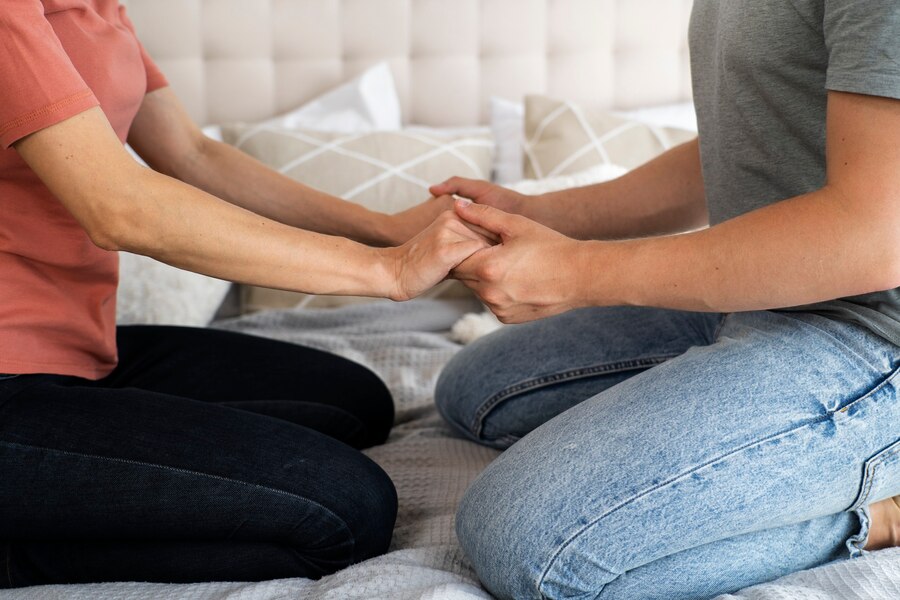Rebuilding Together: How Couples Rehabs Transform Relationships and Lives
Addiction is often perceived as an individual struggle, a battle fought within the confines of one’s mind and body. However, its repercussions extend far beyond the person directly afflicted, seeping into the very fabric of relationships and families. When a couple is involved, the impact of addiction is magnified, affecting not just their emotional and physical well-being but also their shared dreams, aspirations, and future.
In recent years, the landscape of addiction treatment has evolved to recognize the unique challenges faced by couples battling substance use disorders together. This shift has led to the emergence of specialized rehabilitation programs designed to treat both partners simultaneously. These couples rehabs offer a holistic approach, addressing the addiction while also mending the relational wounds it has caused.
This article delves into the multifaceted world of joint rehabilitation. It explores how these specialized programs not only help individuals overcome addiction but also fortify their relationships, creating a supportive environment conducive to long-term recovery. By understanding the importance of couples rehab, examining various therapeutic approaches, and navigating the journey together, couples can find a path to healing that is both personal and shared.
Couples Rehabs Services 888-325-2454
The Importance of Couples Rehab
Addiction is a formidable adversary that not only affects the individual but also profoundly impacts their relationships, particularly intimate ones. Couples rehab offers a unique and transformative approach to addressing substance abuse by involving both partners in the recovery process. This section delves into why couples rehab is essential, highlighting its role in understanding addiction’s impact on relationships, the benefits of joint rehabilitation, and the creation of a supportive environment for sustained recovery.
Understanding Addiction’s Impact on Relationships
Addiction often acts as a silent saboteur in relationships, eroding trust, communication, and emotional intimacy. Substance abuse can lead to patterns of deceit, neglect, and emotional volatility, creating a toxic cycle that is difficult to break. Both partners may find themselves trapped in a web of co-dependency, enabling behaviors, and mutual resentment. Recognizing the multifaceted ways addiction affects relationships is the first step in addressing the underlying issues that fuel both the substance abuse and the relational discord.
In couples rehab, therapists work with both partners to uncover how addiction has infiltrated their relationship dynamics. This understanding fosters empathy and compassion, laying the groundwork for mutual healing. By addressing these deeply rooted issues, couples can begin to dismantle the destructive patterns that have kept them ensnared.
Benefits of Joint Rehabilitation
One of the primary benefits of couples rehab is its holistic approach to recovery. Traditional rehab programs often focus solely on the individual, but couples rehab recognizes that the relationship itself can be both a source of pain and a wellspring of strength. Joint rehabilitation allows couples to work through their issues in tandem, providing a unique opportunity for both partners to heal simultaneously.
When both partners are engaged in the recovery process, they can hold each other accountable, offer emotional support, and celebrate milestones together. This shared journey can significantly enhance motivation and commitment to sobriety. Additionally, couples rehab often includes joint therapy sessions where partners can practice new communication skills, resolve conflicts, and rebuild trust in a controlled and supportive setting.
Creating a Supportive Environment
A crucial component of successful rehabilitation is the environment in which recovery takes place. Couples rehab programs are designed to create a nurturing and supportive atmosphere where both partners feel safe to express their vulnerabilities and work through their issues. This supportive environment extends beyond the therapy sessions, encompassing the entire rehab experience.
In a couples rehab setting, the focus is on fostering a sense of community and mutual support. Group therapy sessions with other couples facing similar challenges can provide additional perspectives and encouragement. Therapists and counselors are trained to facilitate a positive and constructive atmosphere, helping couples to build resilience and develop strategies for maintaining sobriety long-term.
Creating a supportive environment also involves educating couples on the importance of self-care and establishing healthy routines. By learning to prioritize their own well-being and that of their partner, couples can create a balanced and harmonious relationship that supports their ongoing recovery.
In conclusion, couples rehab is a vital resource for partners struggling with addiction. By understanding the impact of addiction on relationships, embracing the benefits of joint rehabilitation, and creating a supportive environment, couples can embark on a transformative journey of healing and recovery.

Therapeutic Approaches Used in Couples Rehabs
In the journey of recovery, couples rehabs employ a variety of therapeutic approaches tailored to address both individual and relational aspects of addiction. These evidence-based therapies are designed to not only facilitate sobriety but also to strengthen the bond between partners, fostering a healthier, more supportive relationship. Below, we explore some of the most effective therapeutic approaches used in couples rehabs.
Cognitive Behavioral Therapy (CBT)
Cognitive Behavioral Therapy (CBT) is a cornerstone of addiction treatment and is particularly effective in a couples rehab setting. CBT focuses on identifying and challenging distorted thought patterns that contribute to addictive behaviors. For couples, this means addressing negative beliefs and behaviors that may have developed within the relationship due to substance abuse.
Through CBT, couples learn to recognize triggers, develop coping strategies, and modify harmful behaviors. This therapy not only aids in individual recovery but also enhances communication and problem-solving skills within the relationship. By working together, couples can break the cycle of addiction, replacing it with healthier patterns of interaction.
Dialectical Behavior Therapy (DBT)
Dialectical Behavior Therapy (DBT) is another powerful tool used in couples rehabs, particularly for those struggling with intense emotions and unstable relationships. DBT combines cognitive-behavioral techniques with mindfulness practices, helping individuals regulate their emotions and improve interpersonal effectiveness.
In a couples rehab setting, DBT focuses on fostering acceptance and change. Partners are taught skills such as emotional regulation, distress tolerance, and effective communication. These skills are crucial in managing the emotional turbulence often associated with addiction and recovery. By learning to navigate their emotions together, couples can build a more resilient and supportive relationship.
Family Systems Therapy
Family Systems Therapy views addiction as a symptom of dysfunction within the relational system. This approach is particularly relevant for couples, as it addresses the dynamics and patterns that contribute to substance abuse. The goal is to create a more balanced and healthy relationship by changing the interactions and communication patterns within the couple.
In couples rehabs, Family Systems Therapy involves both partners in the therapeutic process, encouraging them to explore their roles and responsibilities within the relationship. This therapy helps couples understand how their behaviors impact each other and the relationship as a whole. By fostering mutual understanding and cooperation, Family Systems Therapy paves the way for collective healing and growth.
Navigating the Journey Together
Embarking on the path to recovery as a couple is a profound yet challenging experience. It requires mutual commitment, patience, and an unwavering belief in the possibility of change. In this section, we explore the essential components that facilitate navigating the journey together, ensuring that both partners emerge stronger and more connected.
Building Trust and Communication
Trust is the cornerstone of any relationship, and for couples battling addiction, it often becomes a fragile element. Rebuilding trust begins with open and honest communication. Therapeutic sessions in couples rehabs focus on fostering a safe space where partners can express their fears, frustrations, and hopes without judgment. Techniques such as active listening and assertive communication are emphasized to help couples articulate their feelings effectively. By addressing underlying issues and adopting transparent communication practices, couples can start to mend the broken bonds of trust.
Setting Goals and Milestones
Recovery is a marathon, not a sprint. Setting realistic and achievable goals can provide a sense of direction and purpose. In couples rehab, therapists work with partners to establish both individual and joint milestones. These goals may range from short-term objectives, like attending therapy sessions regularly, to long-term aspirations, such as maintaining sobriety for a year or more. Celebrating these milestones, no matter how small, reinforces positive behavior and encourages continued progress. It’s about creating a roadmap that guides the couple through the recovery process, offering tangible markers of success along the way.
Maintaining Long-Term Sobriety
Achieving sobriety is a significant victory, but maintaining it requires ongoing effort and vigilance. Couples rehabs equip partners with the tools and strategies needed to sustain long-term sobriety. This includes developing relapse prevention plans, engaging in continuous therapy, and participating in support groups. Couples learn to identify potential triggers and implement coping mechanisms to handle stress and temptation. Moreover, the journey doesn’t end when rehab does; aftercare programs and follow-up sessions are crucial for providing ongoing support. By staying committed to their recovery plan and leaning on each other for support, couples can navigate the complexities of maintaining long-term sobriety together.
In conclusion, navigating the journey to recovery as a couple is a multifaceted process that demands dedication, empathy, and mutual support. Through building trust and communication, setting and achieving goals, and maintaining long-term sobriety, couples can transform their lives and heal their hearts. The journey may be arduous, but with the right therapeutic interventions and a shared commitment to change, couples can emerge from rehab stronger and more united than ever before.
Couples Rehabs’ Transformative Therapies
The journey of recovery is a profound and often challenging endeavor, but when navigated together, couples can find renewed strength and resilience within their relationships. Couples rehab offers a unique and essential pathway for healing, addressing both individual and shared struggles with addiction. By focusing on the interconnectedness of personal growth and relationship dynamics, these specialized programs provide a comprehensive approach that traditional rehabs might lack.
The importance of couples rehab cannot be overstated. Addiction’s impact on relationships is profound, often eroding trust, communication, and emotional intimacy. Joint rehabilitation not only addresses these issues but also fosters a supportive environment where partners can rebuild their connection and work towards a common goal. This collaborative effort is crucial for long-term recovery, as it reinforces the idea that healing is a shared journey.
The therapeutic approaches utilized in couples rehabs, such as Cognitive Behavioral Therapy (CBT), Dialectical Behavior Therapy (DBT), and Family Systems Therapy, are instrumental in addressing the complex layers of addiction and relationship dynamics. These therapies equip couples with the tools to understand their patterns, develop healthier communication strategies, and create a supportive network that promotes sustained sobriety.
Navigating the journey together involves more than just overcoming addiction; it requires building trust, setting achievable goals, and maintaining a commitment to long-term sobriety. By fostering open communication and mutual support, couples can transform their lives and relationships, emerging stronger and more connected than ever before.
In conclusion, couples rehabs offer transformative therapies that not only heal hearts but also heal lives. By addressing addiction within the context of the relationship, these programs provide a holistic approach to recovery that benefits both individuals and their partnership. As couples navigate this journey together, they pave the way for a future filled with hope, trust, and enduring love.

- FAQ: What are couples rehabs and how do they help in healing relationships? Answer: Couples rehabs are treatment centers that provide specialized programs for couples struggling with addiction or mental health issues. These rehabs offer transformative therapies that focus on healing both individuals and their relationships, addressing underlying issues and promoting mutual support and growth.
- FAQ: How do transformative therapies offered at couples rehabs contribute to healing hearts and lives? Answer: Transformative therapies offered at couples rehabs aim to heal hearts and lives by providing evidence-based modalities that help couples rebuild trust, improve communication, and develop healthier coping mechanisms. These therapies address the root causes of addiction or mental health issues, fostering lasting change and enhancing overall well-being.
- FAQ: What types of transformative therapies are commonly used in couples rehabs? Answer: Couples rehabs utilize various transformative therapies, including couples therapy, individual therapy, group therapy, experiential therapies, holistic approaches, and specialized programs tailored to address specific relationship dynamics or issues. These therapies work together to promote healing and growth in relationships.
- FAQ: Can couples rehabs accommodate couples with different substance abuse or mental health issues? Answer: Yes, couples rehabs can accommodate couples with different substance abuse or mental health issues. They provide individualized treatment plans that address the unique needs of each partner, ensuring that both individuals receive the support and therapy necessary for their recovery journey.
- FAQ: How do transformative therapies at couples rehabs help couples overcome codependency? Answer: Transformative therapies at couples rehabs help couples overcome codependency by fostering healthy boundaries, improving communication skills, and promoting individual growth and self-care. These therapies empower couples to develop interdependence rather than codependence, creating a foundation for healthier and more balanced relationships.
- FAQ: Can couples rehabs provide aftercare support to couples following treatment? Answer: Yes, couples rehabs provide aftercare support to couples following treatment. Aftercare programs may include ongoing therapy, support groups, relapse prevention strategies, and access to resources that help couples sustain their progress and continue their healing journey.
- FAQ: What role does family involvement play in transformative therapies at couples rehabs? Answer: Family involvement plays a crucial role in transformative therapies at couples rehabs. It helps address family dynamics, heal relational wounds, and strengthen support systems. Involving families in therapy can contribute to the overall success and lasting recovery of couples.
- FAQ: Can couples rehabs accommodate LGBTQ+ couples in their transformative therapy programs? Answer: Yes, couples rehabs can accommodate LGBTQ+ couples in their transformative therapy programs. They provide inclusive and affirming environments where all couples, regardless of sexual orientation or gender identity, can receive specialized care tailored to their unique needs.
- FAQ: How can couples rehabs help couples rebuild trust after addiction or mental health issues? Answer: Couples rehabs help couples rebuild trust after addiction or mental health issues by providing therapy that addresses underlying issues, promotes open and honest communication, and offers tools and strategies to repair and strengthen the foundation of trust within the relationship.
- FAQ: How can couples access transformative therapies at couples rehabs? Answer: Couples can access transformative therapies at couples rehabs by reaching out to the admissions team of the chosen facility. Couples rehabs provide a confidential and supportive environment where couples can take the first steps towards healing hearts and lives.



Recent Comments